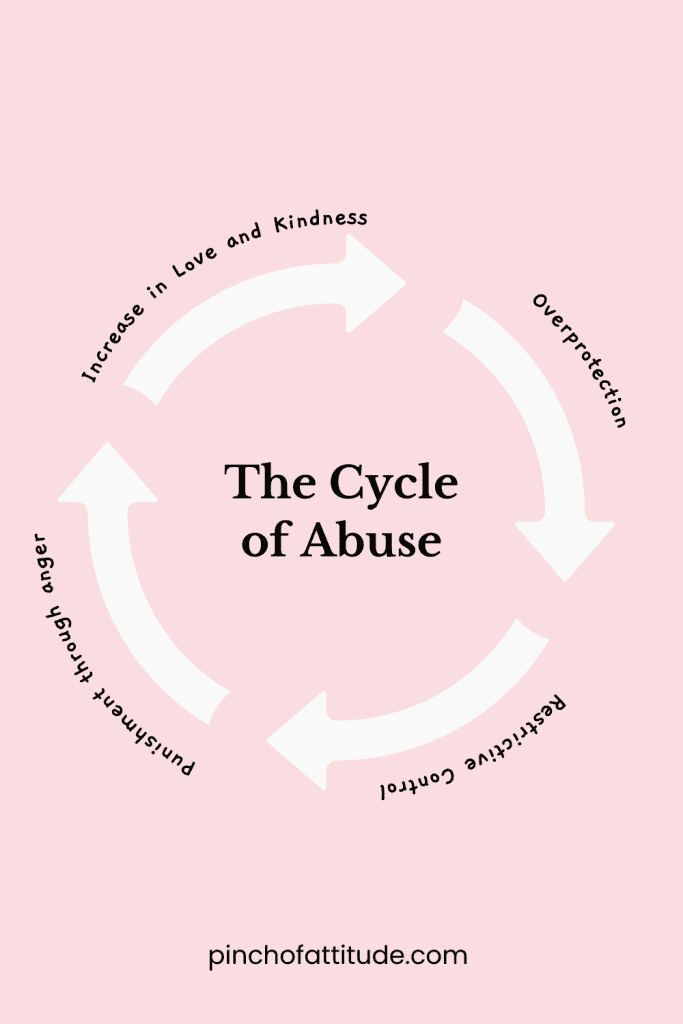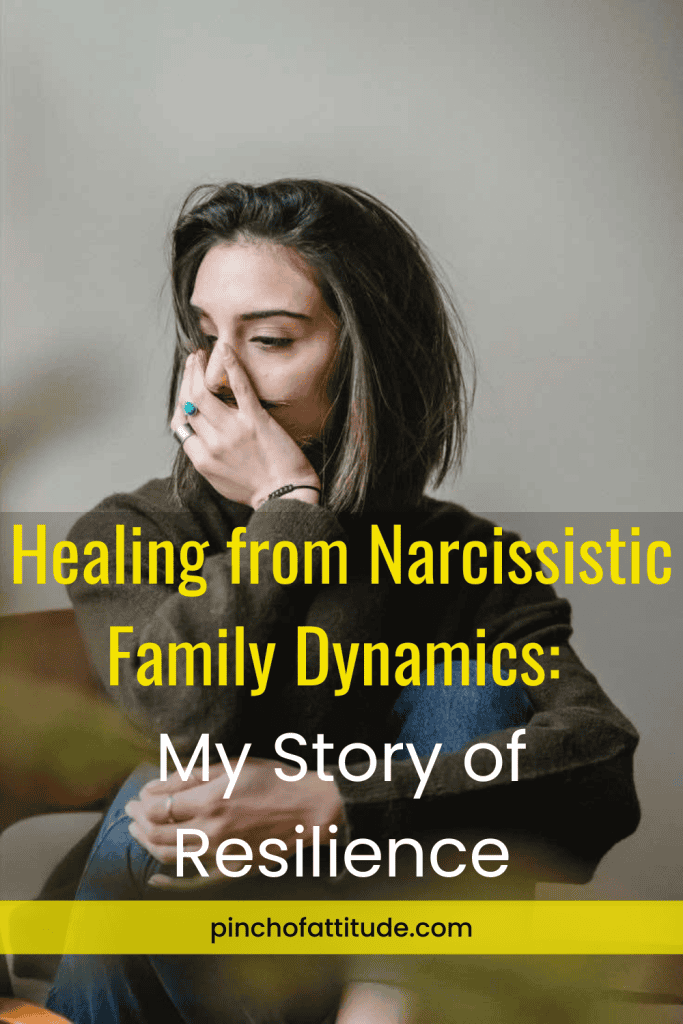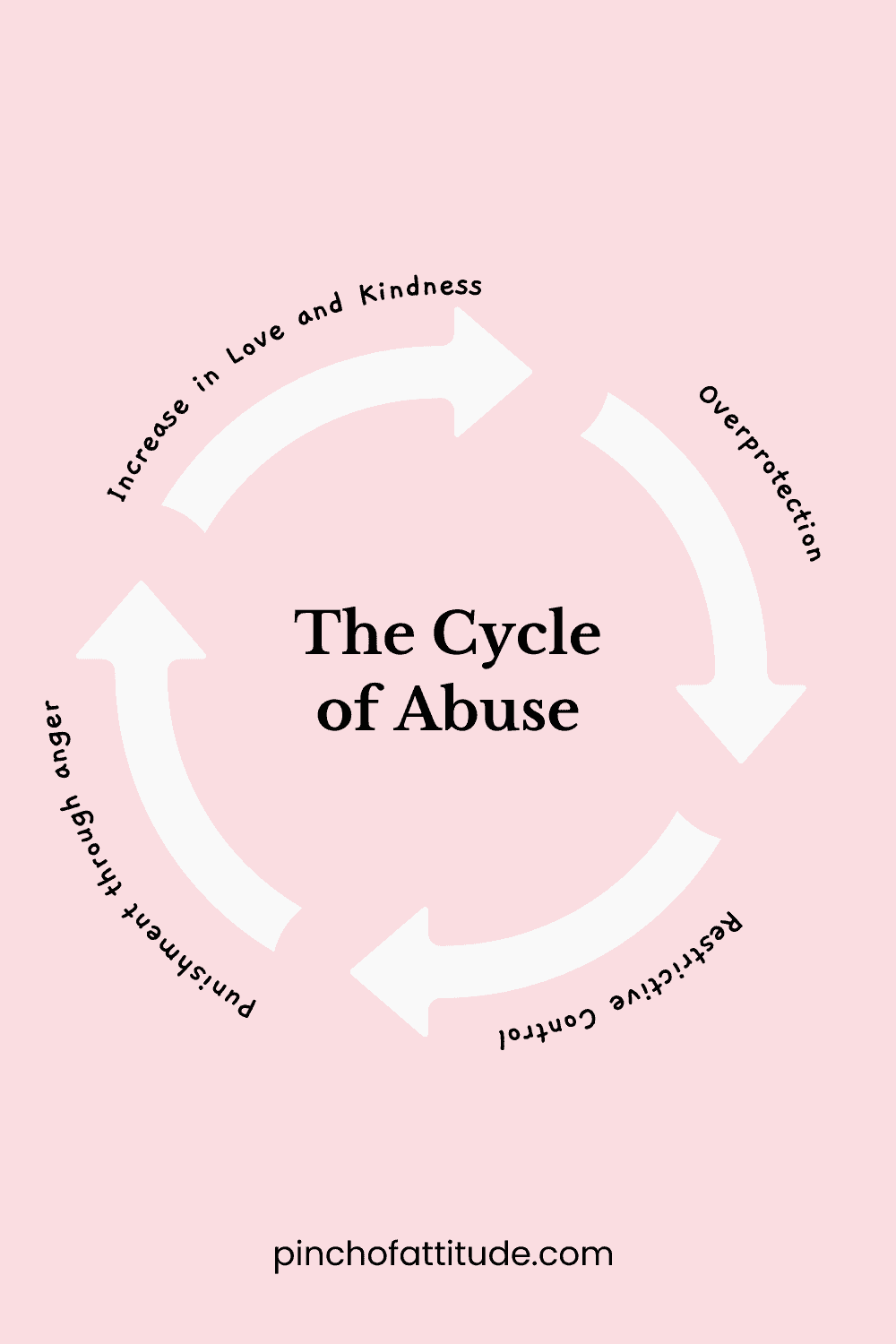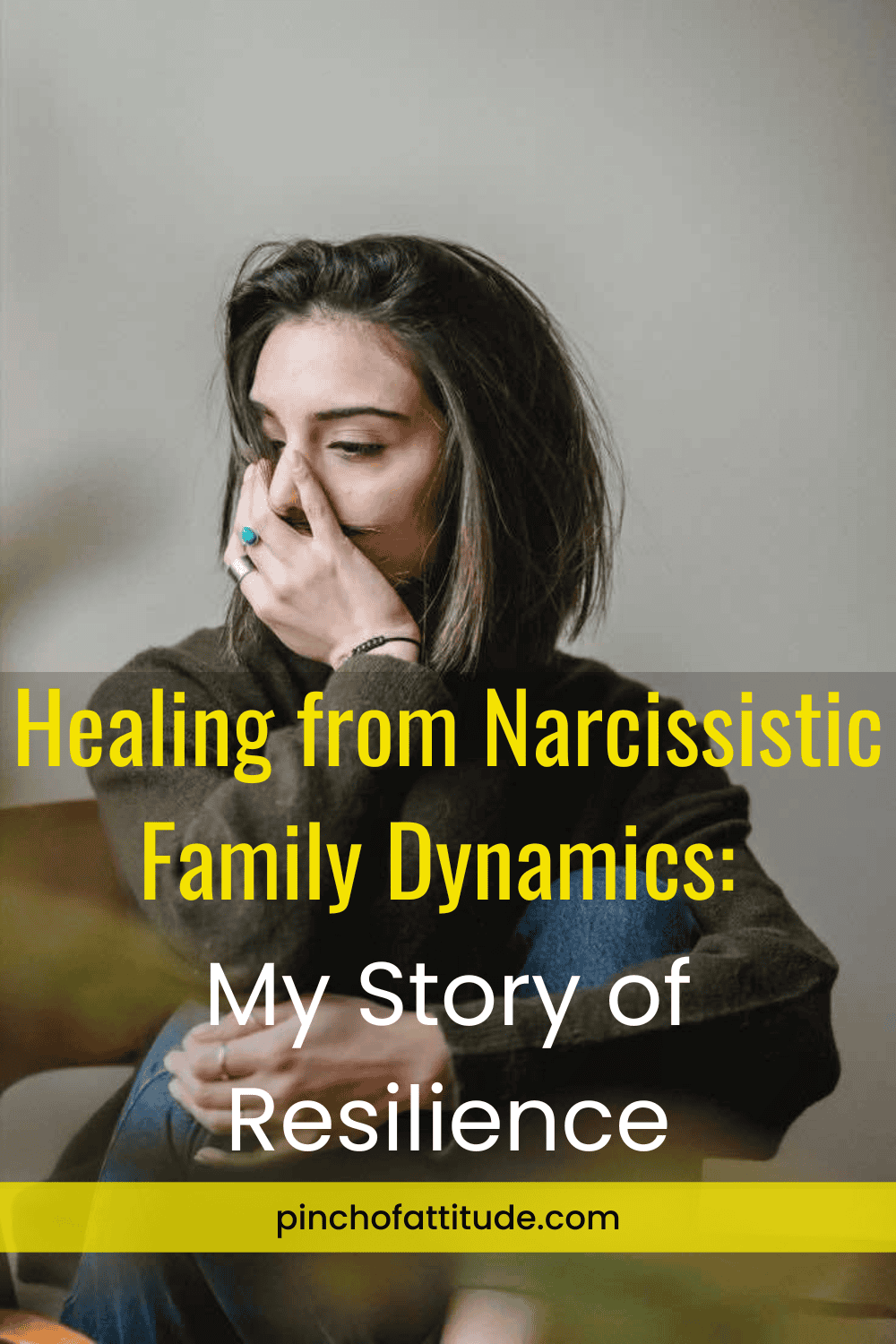Imagine growing up in a home where your needs are constantly ignored, your feelings are consistently invalidated, and your self-worth is repeatedly eroded.
This is the harsh reality of my narcissistic family abuse, a form of emotional and psychological trauma that can leave deep scars on my heart and mind.
Healing from narcissistic family abuse is a journey that can feel daunting and lonely, like navigating a maze without a map.
I’ve been there, walking on eggshells, constantly feeling like I was never good enough, my worth measured by the whims of a narcissistic mother. It took me a long time to repair that deep-seated emotional scar.
It was a suffocating experience, one that left me questioning my sanity and self-worth.
But I’m here to tell you that there is hope, that you are not alone, I’m with you, and that healing is possible.
- Acknowledge the truth about your family’s narcissistic abuse by confronting your reality, you will open the door to self-compassion and empowerment.
- Setting firm boundaries is an act of self-preservation and initiates healing. Don’t feel guilty about it.
- Recognize the control and manipulation of your toxic family, and understand that you’re not responsible for their behaviors and insecurities.
Table of Contents
15 Tips on Healing From Narcissistic Family Abuse: How I Did It?

Taking on the path to narcissistic abuse recovery is a courageous step that can be both challenging and rewarding.
While the healing process is unique to each individual, there are several effective ways to heal to help you reclaim your sense of self and move forward.
Here’s what I did to break the cycle of abuse:
1. Acceptance Is the First Step
Accepting the truth, no matter how difficult, is important for learning how to heal from narcissistic abuse.
You may have spent years minimizing or denying it, but it’s important to acknowledge the abuse that happened.
In my case, confronting the reality was not only difficult but painful. So, I allowed myself to grieve and release the burden of denial.
In acknowledging the truth, I opened the door to self-compassion and reclaimed my power.
2. Set Boundaries to Protect Your Peace
Drawing from personal experience, I realized that setting firm boundaries is not only an act of self-preservation but a catalyst to begin healing.
It will help you feel safer, more respected, and more empowered.
Boundaries can be verbal, nonverbal, or even physical, and they can be established with anyone in your life, including family or friends and even co-workers.
It’s a way of communicating your needs and limits to others, letting them know what is and isn’t acceptable behavior towards you.
It’s about not letting anyone guilt you into doing something that makes you feel uncomfortable or unsafe.
3. Don’t Blame Yourself, It’s Not Your Fault
As a victim of emotional abuse, I know how easy it is to fall into the trap of self-blame.
The constant criticism, emotional abuse, manipulation, and gaslighting can leave you wondering if you’re the one who’s wrong or if you’re the one who’s not good enough.
But the truth is, narcissistic abuse is never your fault. It’s a form of control and manipulation, and it’s designed to make you feel small and insignificant.
Remember that you are not responsible for the behavior of others.
You are not responsible for the choices they make or the words they say. You are only responsible for your own actions and reactions.
4. Deepen Your Understanding of Narcissistic Abuse
As a survivor of narcissistic abuse, I can’t emphasize enough the importance of learning more about narcissism and narcissistic behavior.
When I started, it was like a lightbulb went on. I finally understood why my mother behaved the way she did, and why I had been so susceptible to her manipulations.
This awareness helped me recognize the manipulation and gaslighting that had been keeping me trapped in a cycle of pain.
It also helped me develop empathy for my mom, not in a way that excused her behavior, but in a way that allowed me to recognize that their actions stemmed from deep-seated insecurities and a distorted sense of self.

5. Grab a Notebook and Spill Your Thoughts
In my healing journey, I found solace in the simple act of writing down my thoughts, experiences, and emotions.
It was a cathartic release that allowed me to process the complex dynamics of my family system and the impact it had on my life.
As I wrote, I began to understand the patterns of manipulation and control that had been inflicted upon me.
I was able to identify the gaslighting, the guilt-tripping, and the constant criticism that had chipped away at my self-worth.
So, I encourage you to pick up a pen and let your thoughts flow freely. Writing can be a powerful tool for self-discovery and emotional healing.
6. Find Your Tribe of Uplifting Folks
Surrounding yourself with people who validate your experiences and celebrate your progress will be instrumental to your healing.
Find a tribe that will provide you with the encouragement and support you need to embrace a healthier, happier future.
In my experience, reaching out to a support group of narcissistic abuse survivors provided a safe haven where I could share my story without fear of judgment.
These connections were a stark contrast to the toxic dynamics I had experienced in my past, and they helped me redefine what healthy relationships could look like.
7. Getting Professional Help From a Therapist Doesn’t Hurt
I remember feeling hesitant about seeking help from a mental health professional, fearing that I would be judged or that it wouldn’t make a difference.
But as soon as I stepped into my therapist’s office and began to share my story, I felt a sense of relief and validation.
My therapist listened without judgment, offered insights, and provided me with practical strategies for managing my emotions and setting boundaries with my narcissistic family member.
It was one of the best decisions I’ve ever made.

8. Give Yourself a Daily Dose of Much-Needed Love Through Positive Mantras
Children of narcissistic parents can attest to the power of positive mantras in counteracting negative self-talk.
For me, repeating affirmations of self-worth and resilience helped me challenge the distorted beliefs that had been instilled in me.
To start healing and recovery from narcissistic abuse, I replaced the negative messages I had received from my narcissistic mother with empowering statements.
I would tell myself that, “I am worthy of love and respect,” “I am strong and capable,” and “I deserve to be happy.”
At first, it felt awkward and self-conscious, but I gradually began to believe them.
The positive affirmations started to seep into my subconscious and gradually replaced the negative self-talk that had once held me back.

9. Create New Rituals That Uplift You
Replacing old, toxic patterns with positive practices is one of the best ways to recover from narcissistic abuse.
By incorporating activities that bring you joy, peace, and a sense of empowerment, you can create a life that is aligned with your values and well-being.
Whether it’s a daily walk, meditation, or simple affirmations, these intentional acts of self-care shape a new narrative of healing.
These rituals aren’t just routines. They are the keystones to reconstructing a life filled with authenticity, joy, and healthier relationships.
10. Healing Is Not a Race, Be Patient With Yourself
Healing from the trauma of a narcissistic parent’s abuse takes time, patience, and self-compassion.
So, give yourself the time and space you need to heal, and don’t compare your progress to others. Everyone heals at their own pace.
There will be days when you feel like you’re taking two steps back for every one step forward. But don’t give up.
Just keep moving forward, one day at a time. With time and patience, you will heal.

11. Celebrate Your Wins, No Matter How Small
As an adult child of a narcissist who once bore the scapegoat role, celebrating even the smallest victories became a transformative practice in my healing journey.
When you’ve been conditioned to believe that you’re never good enough, it can be easy to overlook your accomplishments.
But it’s important to remember that every step forward is a step closer to the life you deserve.
Did you finally stand up for yourself to your narcissistic parent? Did you set a boundary and stick to it? Did you take a day for yourself to relax and recharge?
These are all wins! Pat yourself on the back.
Acknowledging progress in the face of abusive behavior is empowering. These triumphs, no matter how modest, are a testament to your resilience and strength.
12. It’s Okay to Step Back When Someone’s Toxicity Is Too Much

As someone who has experienced the effects of narcissistic abuse, I can say that it’s perfectly okay to step back from an abusive relationship.
Cutting off contact with a narcissistic parent or distancing yourself from a toxic family unit is not an act of weakness. It’s an act of self-preservation.
Narcissistic individuals often drain their victims of emotional energy and leave them feeling depleted and worthless.
Reducing or eliminating contact can give you the space you need to heal and rebuild your self-esteem.

13. Hit Pause Through Mindfulness and Meditation
Mindfulness and meditation can serve as powerful anchors that provide you with a sense of calm and clarity amidst the chaos and confusion.
These practices allow you to step away from the narcissist’s abuse tactics and reconnect with your inner self.
You will learn to observe your thoughts and feelings without judgment, allowing them to come and go without getting caught up in them.
In my experience, they allowed me to observe, not absorb, the negativity. They made me realize that my mother’s actions are not a reflection of my worth.
14. Cut the Invisible Strings Tying You to Your Past
Going on a journey to recover from narcissistic abuse can be challenging, especially when you feel tied to your past by invisible strings.
These strings represent the lingering emotional attachments, distorted beliefs, and unresolved traumas that keep you connected to the narcissist and their toxic behavior.
When you cut these strings, you can begin to break free from the patterns that have kept you trapped in a cycle of pain.
Breaking the trauma bond requires understanding the dynamics of narcissistic abuse, developing self-awareness, and cultivating healthy coping mechanisms.
It also involves setting firm boundaries, prioritizing your own well-being, and seeking professional support if needed.
15. Plan for the Future, Your Future
For adult children of narcissists, envisioning and actively shaping their future is among the most effective ways to cope and overcome the hurt.
Narcissists often leave their victims feeling lost, directionless, and unsure of their place in the world.
But by reclaiming your narrative and charting your own course, you can maintain a sense of purpose and embrace a life filled with meaning.
It’s about setting goals, both big and small, that motivate you to move forward and create a life that is truly yours.
It’s a way of saying, “I am worthy of a happy and fulfilling life,” and taking steps to make that a reality.
What Are the 10 Stages of Narcissistic Abuse Recovery?
Recovering from narcissistic abuse, the psychological and emotional abuse associated with a narcissistic personality disorder or NPD can be a complex and challenging journey.
It’s important to remember that healing is not a linear process, and there may be ups and downs along the way.
By understanding the stages of narcissistic abuse recovery, you can gain insight into your own healing process and develop strategies for moving forward.
- Shock and denial: The initial reaction to narcissistic abuse is often shock and denial. This is a natural defense mechanism that helps us cope with the overwhelming pain and confusion of the abuse.
- Confusion and disorientation: As the shock wears off, confusion and disorientation may set in. You may question your own sanity and reality, as the narcissist has likely gaslighted and manipulated you to doubt your perceptions.
- Anger and rage: Once you begin to process the abuse, you may experience intense anger and rage. This is a healthy and necessary part of healing, as it allows you to validate your experience and begin to take back your power.
- Bargaining and depression: As the anger subsides, you may enter a stage of bargaining and depression. You may try to make excuses for the narcissist’s behavior or blame yourself for the abuse.
- Cognitive dissonance: Cognitive dissonance occurs when conflicting beliefs exist in the same mind. In narcissistic abuse recovery, it can manifest as a sense of guilt or shame because you let go of the relationship or for feeling angry or resentful towards the narcissist.
- Acceptance and grief: Accepting that you were abused and that the relationship is over is a painful but necessary step. Grief allows you to process the loss of the relationship and begin to move on.
- Reclaiming your identity: Narcissistic abuse can damage your sense of self. You can reclaim your identity by rediscovering your values, interests, and passions. It also means saying no to things that are not in your best interest.
- Building healthy relationships: Narcissistic abuse can damage your ability to trust and form healthy relationships. Accept that rebuilding your social circle takes time and effort.
- Learning to forgive: Forgiveness is not about condoning the narcissist’s behavior. It’s about letting go of anger and resentment so that you can move forward with your life. Forgiveness is a gift you give to yourself.
- Self-care and empowerment: This is when you make time for activities that you enjoy and that make you feel good. It’s when you prioritize your physical and mental health and empower yourself by developing healthy coping mechanisms.
Remember that recovery is a process, and it takes time. With patience, perseverance, and support, victims can heal from narcissistic abuse and build a happy, healthy life.
Related Posts:
- Why The Anger Stage Is a Very Important Part of Healing From Narcissist Abuse?
- 5 Types of People You Need While Healing From Narcissistic Abuse
- 6 Months Therapy: How Did It Help Me Heal From My Family Abuse?
- 7 Therapies to Heal Trauma from Narcissistic Abuse for Good
- 7 Patterns Resilient People Have After Healing From Narcissist Trauma
Frequently Asked Questions
What are the common signs of narcissistic family abuse?
Common signs of narcissistic family abuse include manipulation, gaslighting, and a lack of empathy from family members.
Is therapy effective in healing from narcissistic family abuse?
Yes, therapy can be effective in healing from narcissistic family abuse by providing a supportive space for processing trauma, gaining insights, and developing coping strategies.
Can healing from narcissistic family abuse lead to improved relationships in the future?
Healing from narcissistic family abuse can lead to improved relationships in the future as you establish healthier boundaries, cultivate self-awareness, and choose connections based on mutual respect.
How can you rebuild your self-esteem after narcissistic abuse?
Rebuilding self-esteem after narcissistic abuse involves self-reflection, setting boundaries, and seeking support through therapy or a supportive community.
How long do you need to heal from narcissistic family abuse?
The time needed to heal from narcissistic family abuse varies, but it often involves a gradual process. Seek professional guidance and allow yourself the time needed for recovery.
Will you ever be happy after suffering from narcissistic family abuse?
Yes, happiness is possible after suffering from narcissistic family abuse. With self-care, support, and a commitment to healing, you can build a fulfilling and joyful life.




